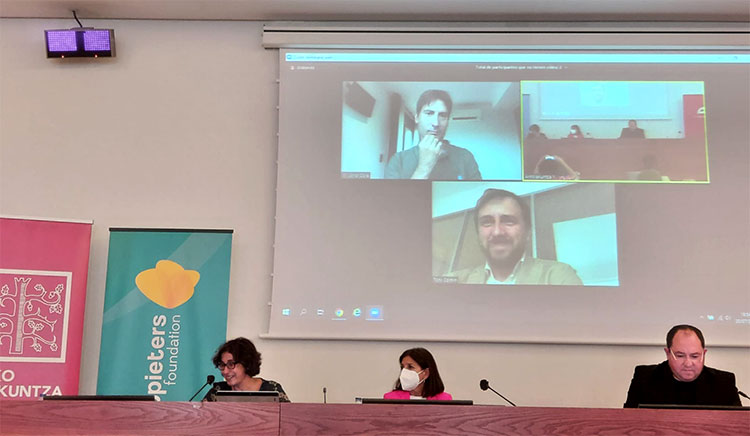
Introduction
At an exceptional juncture such as the one we are experiencing due to the viral pandemic, the debate on the European model and its future has been reactivated. A fair and coherent response to the crisis requires rethinking the current decision-making spaces.
Together with Basque-Catalan europarliamentarians, we will discuss the possibilities of opening these spaces for a European construction of the future.
This round table is presented as a prelude to the academic and socio-political debate that will take place in the international conference Territorial Sovereignty Conflicts: towards a code of good practices organized by Eusko Ikaskuntza and the Institut d'Estudis Catalans to be held on November 11, 12 and 13.
Description
The maintenance of the confederal model in force in the European Union grants absolute protagonism to the current nation-states. The smaller territorial units -regions, nations and stateless peoples- see their capacity of influence in the European framework very limited, and their internal self-government depends on the degree of decentralization granted by the mother states. At an exceptional juncture such as the one we are experiencing due to the viral pandemic, the old debates on the federalization of Europe have been revived. The fairer and more efficient management of funds intended to deal with the serious economic consequences of this health crisis may be linked to a federalization based on territorial units that do not coincide with the current states. The subsidiary management of European funds, as well as the establishment of a European fiscal area that would allow a fair and coherent response to the crisis at the regional level, makes it necessary to rethink the current decision-making areas. This territorial adaptation will most probably make it possible to strengthen the political capacity of peoples, nations or stateless regions, in accordance with the principle of "no taxation without representation". It is not in vain that the political debate on the federal or confederal option takes us back to the beginnings of American constitutionalism and to Alexander Hamilton's proposals in favor of a strong federal government. In a framework of best practices for the resolution of territorial conflicts of sovereignty, the federalization of Europe could facilitate the stateless European nations to achieve a statehood of their own within a common federal European project.
Participants
- Izaskun BILBAO. Member of the European Parliament EAJ-PNV
- Pernando BARRENA. Member of the European Parliament EH Bildu
- Toni COMÍN. Member of the European Parliament JxCat
- Jordi SOLÉ. Member of the European Parliament ERC
Conclusions
Round table: Europe, federal or confederal future?
Izaskun Bilbao Barandica – europarlamentary of EAJ-PNV-, Pernando Barrena Arza – europarlamentary of EH BILDU-, Toni Comín – europarlamentary of JxCat - and Jordi Solé – europarlamentari of ERC- took part in the debate.
The debate took place just before the negotiations of the European Council, when it negotiated what has finally been called the "great pact for recovery", with which to face the crisis caused by the coronavirus. The debate analyzed the current context of the crisis, the challenges to be addressed, and the measures that the European institutions were proposing to deal with it, as well as the different positions that the member states held with respect to them.
The need to implement measures to strengthen the position of European institutions such as the Commission and the Central Bank in managing the crisis was debated, promoting federalizing tendencies as opposed to the more confederal position of certain member states, in which the right to veto has been holding back the evolution of the Union. The debate reflected the different expectations of each speaker in relation to this evolution towards a more federal model.

What they did share was that we are in a new constitutional moment for Europe, a special moment - which some people even called a window of opportunity: their Hamiltonian moment - to achieve a Europe in which the higher European interests could prevail over those of the nation-states, in a framework of European sovereignty with stronger solidarity mechanisms.
This "historic" moment of reformulation of the European project raises major questions about how to democratically legitimize a European power that must succeed in sharing its own resources (directly imposed by Europeans) and common challenges. The stateless peoples of Europe are part of this European democratic legitimacy and in these moments of structural changes new collaborative spaces can be opened to give voice to the singular visions that until now have been hidden. It may be time to deepen their effective decision-making capacity in the European project. As Jordi Solé pointed out: "It is time to delve into those visions that allow us to go beyond" and take advantage of the opportunities of a shared European future.
Video
Place
Bizkaia Aretoa UPV/EHU. Abandoibarra Etorb., 3, 48009 Bilbo, Bizkaia
Organizers





